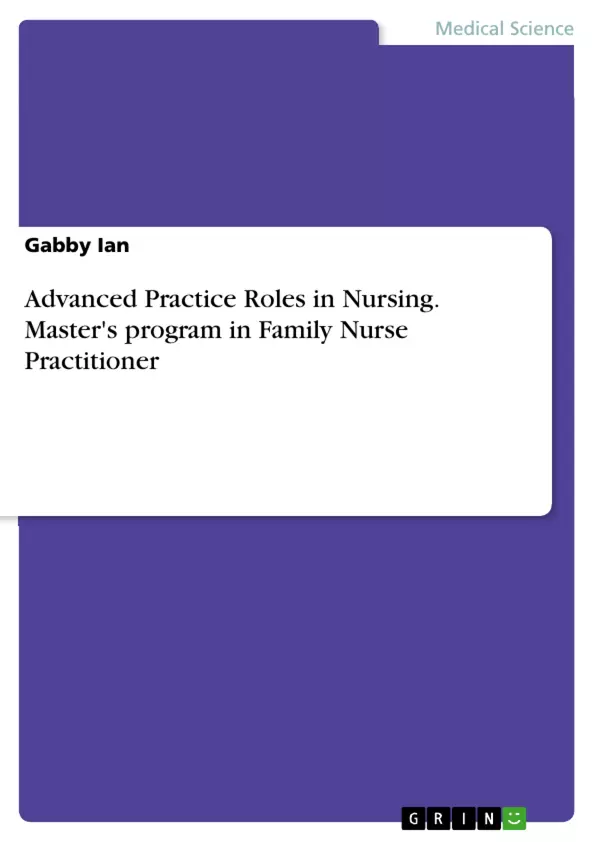The roles and obligations of advanced nurses have changed significantly ever since the American Association of Registered Nurse Practitioners (AARNPs) began accepting extra complex and more comprehensive duties. In the recent past, the healthcare providers were only allowed to take simpler and supplementary tasks and leave the complex ones to doctors.
Nevertheless, following the breakthrough that oversaw the introduction and admission of nurses to pursue advanced degree programs in nursing, most nursing healthcare professionals can now work alongside doctors and discharge duties that were previously reserved only for doctors. In this connection, I have chosen to pursue Masters in Family Nurse Practitioner (FNP) as my specialty at South University.
Inhaltsverzeichnis (Table of Contents)
- Introduction
- Advanced Practice Roles in Nursing
- Nursing in Primary Care
- Nursing Role in Education
- Administrative Nursing Role
- Advanced Nursing Practice vs. Advanced Practice Nursing
- A Comprehensive Look of the Role of the FNP
- The Scope of Practice
Zielsetzung und Themenschwerpunkte (Objectives and Key Themes)
The main objective of this project is to provide a comprehensive overview of the role of a Family Nurse Practitioner (FNP) in the healthcare system. This includes examining the legal aspects, certification requirements, core competencies, and scope of practice associated with this advanced practice role. The project also aims to identify the specific population that FNPs work with, the practice environment, and the potential for leadership roles within the profession.
- The evolving roles and responsibilities of advanced practice nurses
- The various domains of practice for FNPs, including clinical care, education, and administration
- The unique contributions of FNPs to primary care, particularly in managing chronic conditions and providing health education
- The importance of professionalism, leadership, and collaboration in the FNP role
Zusammenfassung der Kapitel (Chapter Summaries)
- Introduction: This chapter provides an overview of the expanding roles of advanced practice nurses, highlighting the historical shift from traditional nursing roles to more comprehensive and complex responsibilities. It introduces the author's personal journey and specialization in Family Nurse Practitioner (FNP).
- Advanced Practice Roles in Nursing: This chapter explores the various domains of practice for advanced practice nurses, including direct clinical care, health promotion, and patient education. It emphasizes the importance of building positive nurse-patient relationships and engaging in comprehensive patient management.
- Nursing in Primary Care: This chapter focuses on the role of nurses in primary care settings, emphasizing their commitment to addressing the root causes of health issues, including hygiene, nutrition, and environmental factors. The chapter also highlights the importance of community involvement and providing care in various settings, including the patient's home.
- Nursing Role in Education: This chapter examines the crucial role of nurses in education, encompassing health education for patients and continuing education for new professionals. It explores the impact of nursing education on fostering critical thinking, decision-making, and teamwork skills.
- Administrative Nursing Role: This chapter delves into the administrative aspects of advanced nursing practice, focusing on care management, service administration, and the importance of communication and collaboration among healthcare professionals. The chapter also emphasizes the need for emotional support and stress management for nurses working in challenging environments.
- Advanced Nursing Practice vs. Advanced Practice Nursing: This chapter clarifies the distinctions between the terms "Advanced Nursing Practice" (ANP) and "Advanced Practice Nursing" (APN), providing a comprehensive overview of the various specialties within each category. It highlights the increasing autonomy and independence of advanced practice nurses.
- A Comprehensive Look of the Role of the FNP: This chapter introduces the specific focus of the project on the Family Nurse Practitioner (FNP) specialty. It outlines the key areas to be examined, including legal aspects, certification requirements, core competencies, scope of practice, and the practice environment for FNPs.
- The Scope of Practice: This chapter provides a detailed description of the scope of practice for Family Nurse Practitioners (FNPs). It highlights their expertise in providing comprehensive primary healthcare services to diverse patient populations, including infants, children, adolescents, adults, and geriatric patients. The chapter also emphasizes the FNP's role in health promotion, disease management, and treating acute illnesses.
Schlüsselwörter (Keywords)
The primary keywords and focus topics of this project include advanced practice nursing, Family Nurse Practitioner (FNP), primary care, health promotion, disease management, patient education, scope of practice, legal aspects, certification, core competencies, and professional leadership.
Frequently Asked Questions
What is the role of a Family Nurse Practitioner (FNP)?
FNPs are advanced practice nurses who provide comprehensive primary healthcare services, including managing chronic conditions and treating acute illnesses across all ages.
How have nursing roles changed recently?
Nursing has shifted from performing supplementary tasks to discharging complex duties previously reserved for doctors, thanks to advanced degree programs.
What is the difference between ANP and APN?
The project clarifies the distinctions between "Advanced Nursing Practice" (ANP) and "Advanced Practice Nursing" (APN), highlighting the increasing autonomy of these specialties.
What are the core competencies required for an FNP?
Key competencies include clinical expertise, health promotion, patient education, leadership, and collaboration within primary care settings.
Which patient populations do FNPs serve?
FNPs work with diverse populations, including infants, children, adolescents, adults, and geriatric patients.
- Quote paper
- Gabby Ian (Author), 2020, Advanced Practice Roles in Nursing. Master's program in Family Nurse Practitioner, Munich, GRIN Verlag, https://www.grin.com/document/1239609



